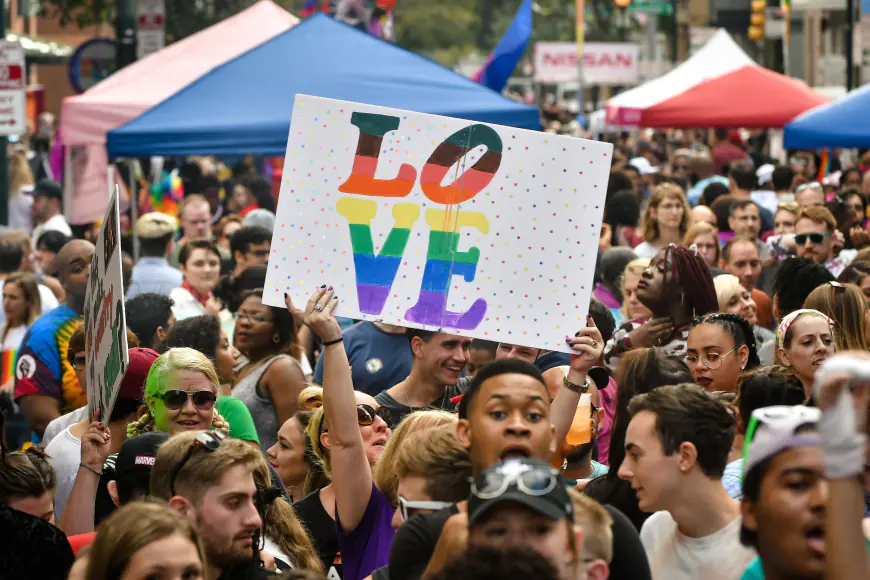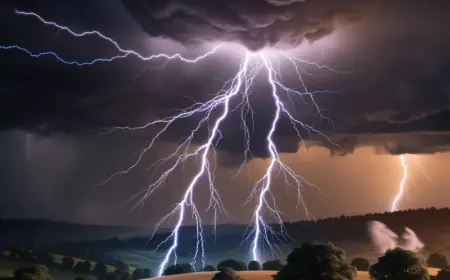Anxious this holiday season? There’s help available
“How are you feeling?” That casual greeting has become a fraught question for many people across the U.S. — including in Philadelphia — now that we’re living in a post-Election […] The post Anxious this holiday season? There’s help available appeared first on Billy Penn at WHYY.


“How are you feeling?”
That casual greeting has become a fraught question for many people across the U.S. — including in Philadelphia — now that we’re living in a post-Election 2024 world, approaching potentially awkward holiday conversations, and preparing for a new year and an incoming presidential administration promising big, disruptive change.
For some, the election results were thrilling, while for others, it has brought despair. Such extremes are natural and expected, say mental health professionals, who spoke with Billy Penn about how anxiety amidst uncertainty is normal. They also shared resources and strategies for coping with stress, grief, and the realization that peers and neighbors are experiencing far different realities from each other.
“It’s rare to encounter someone with an indifferent response to what happened [with the election]. So their inner systems, emotions, thoughts, behaviors get very active,” explained Ken Beldon, a psychotherapist and licensed clinical social worker in Conshohocken.
While the election is more than a month in the past, Americans continue to talk of the possibility of impending displacement and hostility toward some groups, including immigrants and members of the LGBTQ+ community. Add in the holidays, when gatherings can venture into culture war and political issues, and these are anxious days.
What’s important, Beldon said, is that instead of isolating and withdrawing from life, getting in arguments with people on the internet, or becoming more mistrustful of themselves and others, think about “two A words: Who do we ‘Avoid’? Who do we ‘Attune’ to and with, so we can feel not just our emotions, but bodies?”
“It can be pets, yoga, prayer, meditation, spiritual community, or any kind of trusted community,” Beldon added. “At a time like this, the goal is in finding the places and people that we feel that attunement is real.”
“There are a lot of helpers out there…”
For particularly at-risk communities that were targets for discrimination, deportation, and/or loss of bodily autonomy under President-Elect Donald Trump’s first term in office, finding such places of attunement can be difficult, and is often a matter of survival.
A 2023 Centers for Disease Control report found that trans students “experienced a higher prevalence of violence, poor mental health, suicidal thoughts and behaviors, and unstable housing.”
The Trevor Project recently published a report that found that transgender youth were more likely to attempt suicide after their home state passed a ban on gender-affirming care for youth.
The day after the election, their 24/7 crisis line for LGBTQ youth saw a 700% increase in calls — the largest surge in daily contact ever for the group — according to NPR.
According to a nonprofit in Alabama that serves LGBTQ+ young people, their crisis hotline received more than 5,500 calls in the first 10 days after Election Day, up from the 3,700 calls it typically gets every month.
Immigrants have also been on high alert. Rachel Rutter, an immigration lawyer and director of Pennsylvania nonprofit Project Libertad, told WHYY that her phone has been “blowing up” with calls from immigrant youth wondering how Trump’s victory will impact their cases and statuses. Teachers are also reaching out to her for advice on how best to support their immigrant students.
“We’re entering difficult times. You’ve heard about the texts being sent to people of color saying terrible things. People feel threatened,” said Joe Pomrink, coordinator with Peer Counseling Service at the William Way LGBT Community Center in Philly’s Gayborhood.
“A lot of commercials seemed to target trans folks during the election,” he said. “People worry, is it going to be an open season?”
Here in Philly, Pomrink and other advocates with the William Way Center’s Peer Counseling Service’s anonymous, free hotline say it has been important to make sure people in Philly and beyond know that they’re not alone.
“Don’t feel hopeless. There’s a lot of helpers out there who want to help other people,” Pomrink said, as “we’re lucky in Philly to have a lot of organizations to help the LGBTQ+ community.”
The Peer Counseling Service is a completely free, anonymous phone hotline that is available from 6 to 9 p.m. on weekdays, Monday through Friday. Anyone can call 267-416-0451 to speak with trained counselors who are peers from diverse backgrounds, ages, genders and life experiences — and who can provide referrals to medical professionals and therapists as needed or desired.
“Sometimes it’s just nice to have someone to listen and who can understand your situation,” said Pomrink.
Philadelphia’s Suicide and Crisis Hotline at 988 or 988LifeLine.org was created just over two years ago as part of wider efforts to expand behavior health access and options. Both the hotline and recently deployed mobile crisis units have continued to receive more calls each year. Data since the most recent election was unavailable at the time of publication.
These hotlines and peer counseling services can be a lifeline — and a stepping stone towards forging real-world connections, away from social media. Although it may seem convenient, avoid using ChatGPT as an alternative to therapy.
If you’re looking for a specific kind of community, ask a peer counselor for resources, or Google “recovery meeting near me” or “churches or synagogues or mosques near me,” said Beldon, the psychotherapist from Conshohocken. And step away from the smartphone or laptop, he advised.
“Connecting with something green or just looking out a window can be soothing for our central nervous system, which can be really stirred up right now. Give yourself permission to slow down and breathe,” he said.
During the COVID-19 pandemic, research found that physical exercise helped patients “deal with pandemic stressors by reducing somatic complaints.”
Examples of local opportunities to connect with Philadelphians include this list of grief-friendly things to do in Germantown and a diverse women’s hiking group that offers healing hikes and grounding experiences, and the transit-based guide to Philly’s green spaces.
Not just an election issue
Anxiety is a challenge for everyone, year-round. Stress isn’t solely a mental health issue, after all. Constant stressors from daily life alone can lead to physical symptoms, what’s known formally as “somatization.”
Even before Election Day, “more than 7 in 10 adults reported the future of our nation (77%) as a significant source of stress in their lives — making it the most common source of significant stress” in this year’s Stress In America survey by the American Psychological Association.
Other top stressors included the economy (77%), the presidential election (69%), U.S. politics (62%), healthcare (55%), violence and crime (54%), the environment (51%), global tension/conflict (51%), and gun laws and regulations (49%).
“In primary care, the approach I take is focused on physical symptoms, like chronic headaches, stomachaches, insomnia after the death of a family member or a car accident or something like that,” said Sharon Chen, a family nurse practitioner in Philly’s Chinatown.
“So we start with a physical exam, and when all other potential causes of the symptoms are ruled out, it usually comes down to: ‘How is your stress level and mood recently?’,” Chen explained, noting that in immigrant populations, there is a hesitance to even discuss mental health, and a resigned internalization of ongoing symptoms as just a part of life.
“After linking physical symptoms to a possible event that happened and their change in mood,” Chen said, she often pivots to “hey, we have a mental health or behavioral health consultant who we can get you set up with.”
The post Anxious this holiday season? There’s help available appeared first on Billy Penn at WHYY.
What's Your Reaction?








































































































